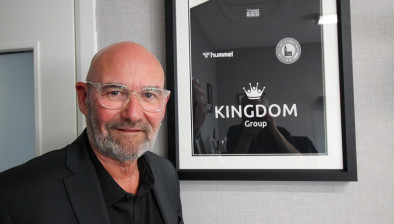Black’s Blog: Jimmy Black thinks about stairs… and how to avoid them

Stairs. A complete nuisance if you have furniture to shift, babies to carry, shopping to bring home. That’s all of us at one time or another. And they’re a nuisance for disabled people too.
So why do we keep on building houses with stairs? Well there’s the shortage of available land, so we build upwards. There are planners’ notions about population density. And there’s force of habit.
There’s an obvious answer to the problem of stairs. In multi storey flats where there are many tenants, economies of scale mean that lifts are practical. But in four in a block houses, or low tenements, the cost of supplying and maintaining a standard lift is too much for most social housing landlords.
Recently at a Digital Health Institute event where housing was the topic, I asked a speaker how we can tackle the problem of getting disabled people safely up the stairs of their tenement homes. Her answer was that decades ago, she had pointed out to social housing developers that lifts are commonplace in Europe. She wondered if our strict building standards made lifts too expensive to fit.
That made me think of the Captain’s House in Dundee, where a water powered lift dating from the 1870s glides up and down between the floors; and we wondered whether there are other technologies which could make access easier and cheaper.
One of the rules of creative thinking is never to reject an outlandish idea until you have tried really hard to think of reasons why it might actually work. So my discussion group at the DHI considered the use of personal drones to help disabled people move around freely, flying in and out of a specially adapted upper floor window. Beats one of those motorised wheelchairs, but currently personal drones cost £300,000.
We thought about building a round tube at the back of a tenement, fitting a drone inside it and using that to propel a lift up and down. A sort of drone pipe. Would that be cheaper than a standard electric lift, and safe?
Then I looked up the internet and found Stiltz, a company which sells lifts designed to fit into small spaces in existing homes. They support themselves, so they do not require supporting walls or major structural alterations. The cheapest wheelchair version costs £14,000; and it plugs into a normal 13 amp socket. It only rises one floor, but that might be enough for many people struggling in town houses or semis. Another company called Stannah does something similar.
Yes, I know, houses have been built with stairs for thousands of years. It’s aye been. Well, evolution took a long time too, but just look at us humans now. Moving house is hugely expensive and stressful for people (and their landlords). It’s time to find a practical solution which means most people can live out their lives in their own homes, and maybe the solution lies somewhere in the Captain’s House, or Stiltz and Stannah, or perhaps even in drones.
Councillor Jimmy Black is a former convener of housing at Dundee City Council and now works for Dundee Voluntary Action promoting Technology Enabled Care.







